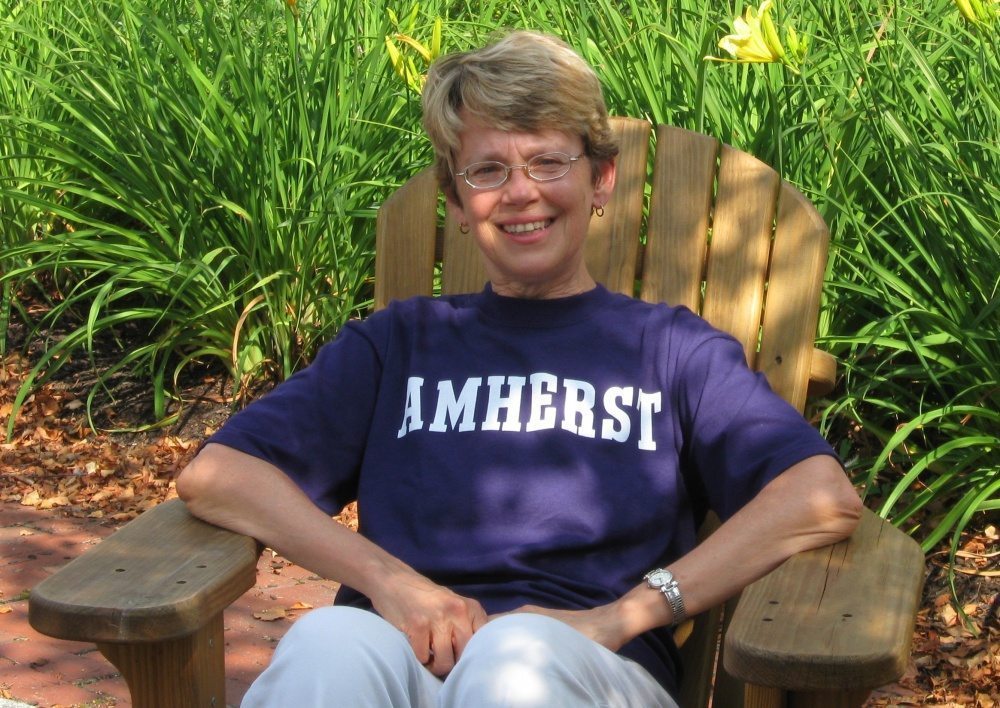Lisa Muller, a participant in the Memorial Library’s 2011 New York Summer Seminar, always knew she would become a teacher. Though a few detours delayed her career after college, she found herself back in the classroom when the principal of Castle High School in Newburgh, Indiana asked her to substitute one day as a favor. She has been teaching there ever since, and now – 30 years later – it is still the daily contact with students and families that inspires her.
Her teaching life took an interesting turn when she attended the National Council of Teachers of English (NCTE) conference in Chicago in 1996, where she heard Holocaust survivor Gerda Weissman Klein speak. Mesmerized, Lisa recalls wondering, “How, after all she’d lost, was she able to be the generous, grateful person she is?” She stayed up all that night reading Gerda’s memoir, All But My Life, and has been studying the Holocaust ever since.
In 2000, the small local Jewish community sought her out as a partner to advocate for the inclusion of a Holocaust curriculum in the Evansville public schools. That year, they established CYPRESS – the Committee to Promote Respect in Schools – and began offering workshops to provide teachers with the kind of life-changing experience Lisa had in Chicago. Featured seminar speakers have included representatives from the US Holocaust Memorial Museum, Facing History, and the ADL, among others.
At school, Lisa assigns her 160 honors-level freshman English students to read both Gerda Klein’s memoir and a historical novel based on the Holocaust. Students conduct research on and write a comprehensive paper on the real events portrayed in the books. Lisa lauds their efforts, adding, “They learn so much in our study of the Holocaust, and I do think that this kind of work and this kind of thinking makes them better human beings as well as better writers.”
Lisa vividly recalls “hoping to someday know as much as my teachers did,” a childhood memory that drives her ongoing learning today. In 2001, she received a Teacher Creativity grant from the Lilly Endowment, which enabled her to visit camps and important sites in Germany, Holland, Belgium, Austria, and the Czech Republic, and to participate in an annual Extending Teacher Creativity Workshop at Indiana State University. She also spent two summers at the Yad Vashem International School, and later became a Teacher Fellow at the US Holocaust Memorial Museum, which forged her connection with the National Catholic Center for Holocaust Education at Seton Hill University in Greensburg, PA.
Through CYPRESS workshops, Lisa brings her mission to study the Holocaust to her colleagues. In September 2014, she organized an all-day workshop for 29 teachers at her high school with the full support of her principal. It featured a speaker from Yad Vashem and centered on the “Echoes and Reflections” curriculum. One participant said it was the best professional development program she had attended in her 38 years of teaching. With follow-up programs scheduled, Lisa observes that “we are developing a good community of Holocaust educators.”
CYPRESS community-wide initiatives have far-reaching impact on the greater Evansville area as well. The most recent event, “Evansville Remembers WWII and the Holocaust,” represented a successful, several months’ long collaboration with the Evansville Museum of Art, History, and Science, the Evansville Philharmonic, the public library, two universities, and other local entities. Its centerpiece was The Fabric of Survival, an exhibit of primitive needlework panels by Polish survivor and artist Esther Nisenthal Krinitz on display at the museum. Lisa, who helped spearhead the effort to bring the exhibit to the community, praises it for “touching everyone who sees it. It has much to say about the power of art to tell our stories and heal our wounds.”
Esther’s daughters came to the exhibit’s opening, an experience which participants found life-affirming. Likewise, the multitude of events that composed “Evansville Remembers” proved transformative for the thousands of students and community members who attended concerts, read books, heard speakers, and attended the teacher’s workshop. One man told Lisa that he stepped back and looked at the individual panels on display in the gallery and for the first time in his life, grasped the scope of what happened during the Holocaust. “He finally saw the whole picture.”

Educator Lisa Muller of Castle High School, Indiana.
